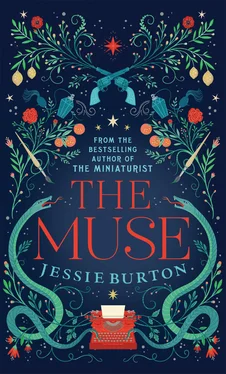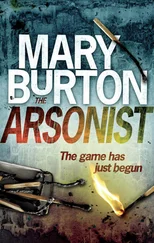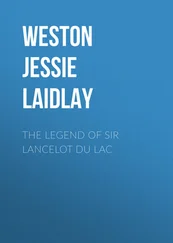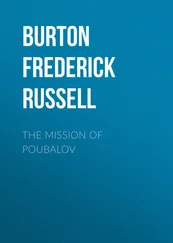It was the German family who had caught and dismissed her. Isaac had gone to talk to them, explaining that she had mental problems — which was a lie, but was better than letting the Frau report her to the Civil Guard. He’d returned everything to them, but she kept quiet about the Banetti box, the emerald necklace hidden in their garden. It was her little private escape.
‘Tere,’ Isaac said more softly, bringing her back into the room, the sound of the rabbit innards slick on the blade. ‘Olive can’t be your friend, you know.’
‘You should take your own advice.’
‘I know it must be lonely for you when I’m in Malaga. But she’s some rich kid drifting around after her parents and before you know it, she’ll be gone again. I don’t want you to—’
‘I’m not lonely. And I’m not a child. You don’t need to be so patronizing. I don’t want to be her friend.’
‘Good.’ He began to dismantle the rabbit’s leg. ‘Come and help.’ She slunk from the table and stood next to him. ‘You can’t tell me what to do, either, Tere,’ he said.
‘I can try.’
He laughed, and she did too. ‘Haven’t I always looked after you?’ he asked.
‘Yes, Isa. But I never needed you to.’
*
Harold had not seemed to notice his wife and daughter’s absence particularly. He seemed distracted, sitting at his desk in the middle of his study, marooned on the Moroccan tapestries he’d bought from a rug trader in Malaga, elbows digging into the fraying leather top, barely acknowledging Teresa as she dusted round him, or left him a glass of fino at his side. He looked like the captain of a drowning vessel who had found a piece of driftwood and was clinging on for dear life.
On the day the women were having their last painting session, and Teresa was in the finca preparing a stew, the telephone rang. She waited, but Harold was nowhere to be seen. ‘Señor?’ she called. The house was silent, except for the telephone ringing and ringing. She tiptoed along the corridor towards the study, listening through the door before she went in, making her way across the rugs. As she hefted the Bakelite handle to her ear, she knew she’d made a mistake.
‘ Harold, bist du es? ’ It was a woman’s voice. Teresa remained silent, listening to the caught pocket of air as the woman inhaled sharply and the line went dead. She looked up; Harold was standing at the door, in his coat, holding his hunting rifle.
‘What are you doing?’ he said. ‘Teresa, what the hell are you doing?’
Teresa looked dumbly at the receiver, wishing in that moment that she’d never come to this finca, that she’d found work elsewhere. It had not been enough for her to move only between the tissue layers of the Schlosses’ lives — she had wanted to be closer, to the scars and the spots and the hot red mass of their hearts. But now she remembered the danger of knowing other people’s secrets.
Harold came towards her as she slammed the receiver down. He put his hand on top of hers, and she was surprised by how warm it was. ‘Teresa,’ he said, smiling, his hand exerting the minimum of pressure. ‘Who could you possibly be wanting to call?’
She looked at him in confusion, and then she understood, rearranging her face into humility, still hearing the echo of the woman’s hopeful voice, her panicked breath when she realized Harold wasn’t on the other end.
‘I am sorry, señor,’ she said. ‘I wanted to speak to my aunt in Madrid.’
They fixed their eyes upon each other and Harold released her hand. He walked round and sat in his chair, opening the breech of the rifle. ‘All you had to do was ask, Teresa.’
‘I am sorry, señor,’ she repeated. ‘It will not happen again.’
‘Good. All right. Off you go.’
She was at the door when he spoke again. ‘Where is my wife?’ he asked her, and Teresa turned back to face him, fear bursting in her stomach.
‘She is at the market, señor.’
‘At six in the evening?’ Harold locked the rifle and pushed back his chair.
‘Yes. But she wanted to visit the church after.’
‘The church?’
‘Yes. La iglesia de Santa Rufina .’
He laughed. ‘You know Mrs Schloss is not well, Teresa. If she keeps wandering off like this, you must tell me. Keep an eye out for her.’
‘ An eye out ?’
‘Keep watch for her. Wait here until she comes back. And when she does, tell her I’ve got work in Malaga. She’ll understand.’
‘ Sí, señor .’
‘Is Olive with her, at the church?’
‘Yes.’
‘I’m glad they’re spending time together.’ He laid the rifle on his desk. ‘Teresa, I want your opinion.’
‘Yes, señor?’
‘Do you think the villagers would like us to hold a party?’
Teresa imagined that a party held by the Schlosses would be the most glamorous thing any of the villagers had ever seen — and she would be in the centre, organizing it. They wouldn’t mock her after that — no more gypsy slurs or bastard comments. The power of Harold and Sarah Schloss would reflect in glorious technicolour — on her. ‘I think it would be wonderful, señor,’ she said.
She hurried back to the kitchen to see to the stew, and heard Harold pacing in his bedroom, the stop-start of his feet as he moved back and forth from his closet to try on several outfits. He reappeared in a beautiful wheat-coloured suit, with a blue shirt underneath, which set against his dark hair and made him look incredibly refined.
His motor car revved and when he was gone, Teresa felt heavy again, burdened by Harold, bist du es? , by the secret they both knew he had entrusted her to keep. He had left a trail of cologne. A sharp, ambery echo of dark leather chairs and darker corners.
*
When she returned to the cottage, Isaac was packing away his paint materials in his bedroom. In the kitchen, a sheet was over the painting, as he would not allow anyone to see it before it was completed. Sarah had left, but Olive lingered at the table. She looked tired, and Teresa watched out of the corner of her eye how her hands moved constantly. Teresa could not marry this urchinous twitcher with the stately, confident artist up in her attic. She wondered if Olive had painted anything new, and whether she’d be permitted to see it.
‘Your father asked where you were,’ Teresa said. ‘I told him you had gone to the church of Santa Rufina with your mother.’
‘Where’s that?’
‘In the village square.’
‘My mother doesn’t know about this.’ Olive rose to her feet. ‘I’ll have to get to her before Daddy does.’
‘He’s gone out,’ Teresa said.
Olive’s face fell. ‘Of course he has.’ She sat back down.
‘Are you enjoying being painted?’ Teresa asked.
‘I don’t think I make a very good subject. My mother loves it, of course.’
‘Your father will be very happy to see it.’
‘Maybe. If it’s any good. Isaac won’t let me look.’
‘Your father — he tells me he is going to have a party.’
Olive groaned. ‘Is that what he said?’
‘Do you not want a party, señorita?’
‘You haven’t been to one of my parents’ parties. I think I’d rather visit the church.’
She was in an irritable mood, and Teresa wondered quite how badly the portrait session had gone between Olive and her mother. All Teresa could conclude was that whilst Sarah was born to be watched, Olive was more of a watcher.
She walked to the counter, fetched an onion and a knife, and began to chop. ‘Do you know the story of Santa Rufina?’ she asked, hoping to distract Olive from her gloom.
Olive gazed towards the darkness of the corridor, where Isaac was moving around in his room. ‘No.’
Читать дальше












